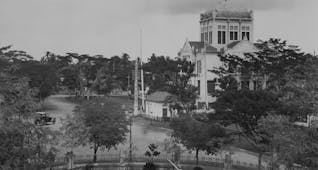When Suharto, Indonesia’s long-serving dictator, fell in 1998 the very integrity of the country seemed in doubt. It faced economic collapse, political chaos and fissile separatist insurgencies in Aceh, Papua and East Timor. In contrast, present-day Indonesia seems almost a miracle. As our special report in this issue describes, it is a stable, largely peaceful democracy with a resilient economy growing at a respectable lick. It is intact—minus what is now independent Timor-Leste. Despite July’s suicide-bombing in Jakarta, Islamist extremism has been marginalised and, in the world’s largest Muslim-majority country, moderation rules. Indonesian policymakers, naturally, congratulate themselves on having steered the country away from the abyss. But that is complacent. Instead, policymakers should be worrying about the fragility of the gains they have made, and about how far the country still is from realising its potential. document. The president, Susilo Bambang Yudhoyono, has a rare chance to try. Re-elected in July with a thumping majority, his Democratic Party also now has more seats than any other in parliament. This, claim his boosters, will allow him to stack his cabinet with competent technocrats and to shake off the timidity with which he pursued reform in his first term. Cynics counter that the former general, who turned 60 this week, is unlikely to shed the dithering habits of a lifetime. Boldness, however, is required: in reforming the economy; intensifying the battle against the scourge of corruption; and entrenching solid democratic processes. In stark contrast to its shipwreck during the Asian financial crisis of 1997-98, Indonesia has sailed through the credit crunch without leaking much water. GDP is expected to grow by more than 4% this year. Fiscal restraint and sustained domestic demand have given the economy solidity. They have not, however, translated into the reduction in poverty that Mr Yudhoyono promised when he came to power in 2004. Nor does Indonesia have a business climate that would allow the economy to grow at the annual 6.5% it averaged under Suharto, let alone the double-digit rates achieved by China. A process not a destination Nor can Indonesia’s most astonishing achievement of all be taken for granted. Although it has established a functioning democracy in a short period, other candidates in July’s election challenged the results. They had a point. The election was badly flawed. There was nothing like an Iranian- or Afghan-style rigging—the abuses seemed more random than systematic. But what really calmed tempers was the margin of Mr Yudhoyono’s victory. Before the next election, a more robust process is essential. Dictatorship already seems a distant memory; the notion of a coup laughable. But much the same was said of Thailand a decade ago, a few years before the army stepped back into politics. Indonesian democracy seems to have firmer foundations, but it would be a serious mistake to assume that they are fully built.
Cek berita, artikel, dan konten yang lain di Google News














